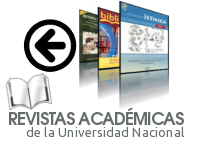The Community Teachers Project (PMC) – A Formation Process Based on University Extension
DOI:
https://doi.org/10.15359/udre.10-1.4Keywords:
university extension, community pedagogy, teachers’ formation, elementary educationAbstract
This article has been developed based on the Community Teachers Project (PMC), attached to the Basic Education Division (DEB) of the Center for Teaching and Research in Education (CIDE) of Costa Rica’s National University (UNA). PMC is a project that is part of the university extension work. One purpose of the actions carried out has been to engage the students/teachers of Pedagogy majors, with emphasis on 1st and 2nd cycles of Special Education and emphasis on educational projects in inclusive contexts, into the national socio-educational reality; this aims to foster their involvement in the implementation of pedagogic strategies intended to tackle the issues of school dropouts in some vulnerable communities of the Province of Heredia.
The methodological approach is based on the research statements and designs of research-action (R-A). Thus, after a research stage on the context and pedagogic dynamics in community spaces, a second stage implemented actions, activities, and strategies of pedagogic mediation to promote spaces for play and creative expression.
Factors contributing to the outcomes of the formation process based on university extension are the assessment of the experience the students have gone through in terms of their accomplishment as related to the implemented processes of pedagogic mediation, as well as their in situ interaction with the children in the school context. Based on the above, a reflection emerges concerning the actions required from university extension projects in vulnerable contexts, specifically in opening pathways in an emerging community pedagogy that faces the challenges of contemporary educational models that go beyond the school settings of elementary education. In this sense, conclusions drawn appeal to assume university extension linked to formation processes and articulate it based on study programs of university majors in what has now been called as “mainstreaming and wholeness of extension,” to integrate it into the formation and curricular processes of teaching, learning, and research.
References
Cieza, J. A. (2006). Educación comunitaria. Revista de Educación, 339, 765-799.
Davini, M. C. (2010). La formación docente en cuestión política y pedagógica (2.ª ed.). Buenos Aires: Paidós.
Flores, L. y Hernández, A. (2017). Comunidades epistémicas: documento de trabajo. Rectoría Adjunta. Universidad Nacional, Heredia. Manuscrito inédito.
Jara, O. (2012). Sistematización de experiencias, investigación y evaluación: aproximaciones desde tres ángulos. Revista Educación Global Research. 1, 56-70.
Tommasino, H. y Rodríguez, N. (2011). Integralidad: tensiones y perspectivas. Cuaderno de Extensión,1 , 19-42.
Downloads
Published
How to Cite
Issue
Section
License

La Revista y cada uno de los artículos que se publican están licenciados por Creative Commons Atribución No comercial Sin derivadas 4.0 Internacional.


